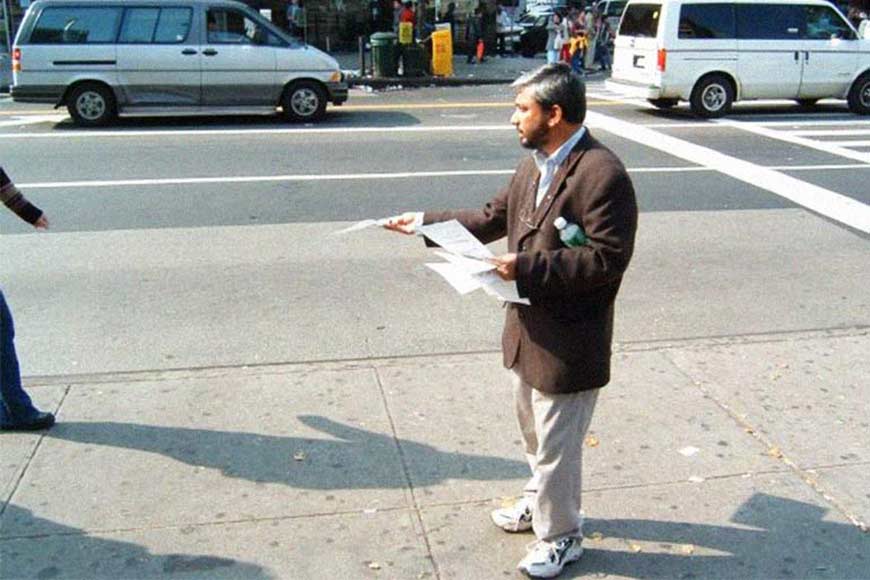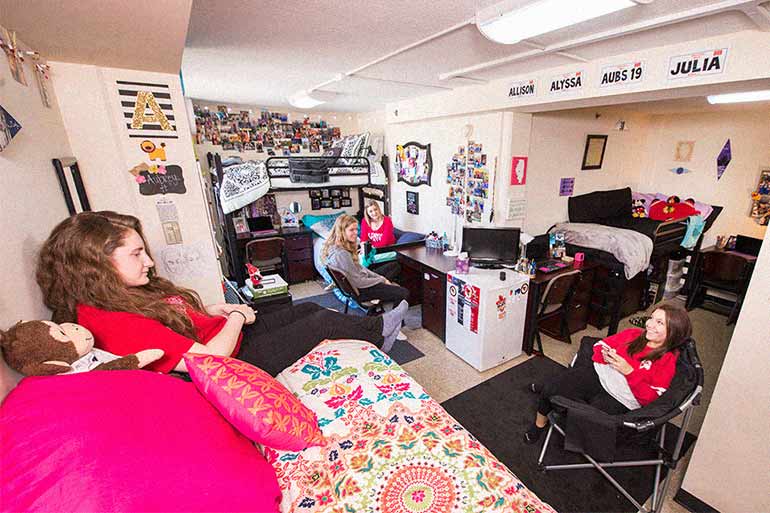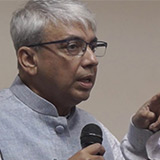Would all colour fade from life forever?

Dr Partha Bandyopadhyay distributes leaflets at New York's Chinatown
The lights on the towering Hewett and Manchester Residence Halls shine in the dark. A red beacon blinks atop the 27-floor dormitory Waterson Towers. The skies here are somehow too clear. Not a speck of dust anywhere. The stars shine overbright. The grass on the lawns stretching into the horizon is extra green. The teenage American girl students bursting with health, pampered daughters from wealthy families of the midwest Illinois corn belt.
A few of my students came from these families. Liz, Samantha, Dawn, Karen. The whiteness of their skin too white, their breasts waxen-smooth, round as pomelos. I spent a lot of the Fall semester just looking at them. Their loose, colourful clothes, bare arms and legs, loose shorts riding high up on their thighs. The boys were the same. T-shirts and shorts, almost every girl accompanied by a boy. Some were boyfriends, some high-school friends doubling as bodyguards.
Their view of a foreign graduate student and teaching assistant like me was a mix of respect, pity, indifference, and a superficial friendship. A slight smile if we happened to meet in passing, and a “hi there”. They aren’t really interested in a deeper acquaintance, neither do they want to date us, at least 95 percent don’t. Even with sexual freedom running rampant, Indians - particularly those of the class I came from - had made very little progress in the matter.
During the Spring semester, I met Ravi Kattur, a young physician from Kerala, and his wife Radha. Sensing my loneliness, he spoke to the university and arranged for the couple to become my host family. Which essentially meant they volunteered to look after me in that faraway land. I did go to their Bloomington home a few times, at their invitation. They were generous, enlightened people, admirers of Rabindranath Tagore and Satyajit Ray, and fans of Bengali films and music.
Of course, there were the ultra-progressive sorts. Such as Narendra from Pune. Apparently a Congress leader back home, a big shot. Bought himself an old Mercedes as soon as he landed. Was the president of the Indian Student Association, with a bevy of young American girlfriends. A few boys from Sri Lanka were in the same league - smart as a whip. Nobody would have guessed they were students from the Indian subcontinent, who had come to America only in 1985. Then there was Andrea, an Indian-origin Caribbean native, her gigantic companion Arun, and many more such. Once or twice, I was taken to one of those riotous dorm parties at night, where light and shade played with each other, and wild music boomed into my eardrums. Halfway through, I would come back home, alone.
A few of the pretty American young women have tried to get close, to melt me with their warmth. Their mesmerising perfume has inflamed my senses. And then my Bengali middle-class sensibilities have kicked in, freezing me solid. Washing cups and plates side by side at the student cafeteria, the charming Sara asked me many questions, making her weakness, her softness obvious. Took me out for pizza and coffee. And then, I walked her to her dorm in Walker Hall. Her eyes, agleam with hope, quickly losing their light. Anne and Lisa took me to their church, even to Sunday Bible school. My indifference to Christ was a disappointment.
I was alone. Terribly alone.
Abu Haider from Chittagong was the son of an immensely wealthy family – they apparently own factories and showrooms back home. Sunita, who like me was here to study, was from an upper class Calcutta family, and there was my roommate Ranjan Gupta, my junior by a few years from Science College. We were the only Bengalis on campus. Illinois State University is a small school, occupying the Normal part of the twin cities of Normal-Bloomington. We rarely visited Bloomington.
During the Spring semester, I met Ravi Kattur, a young physician from Kerala, and his wife Radha. Sensing my loneliness, he spoke to the university and arranged for the couple to become my host family. Which essentially meant they volunteered to look after me in that faraway land. I did go to their Bloomington home a few times, at their invitation. They were generous, enlightened people, admirers of Rabindranath Tagore and Satyajit Ray, and fans of Bengali films and music. I even sang at a few of their gatherings. Their house was huge, so was their car. Indeed, I had never seen a house so large. Neither had I seen a TV with that large a screen. We would watch video cassettes of Hindi films on that huge screen. ‘Paar’, by Goutam Ghosh, starring Naseeruddin Shah, Om Puri, Shabana Azmi. There was food, laughter, conversation, once every fortnight or so.
And yet, I was alone. Terribly alone.
Sponsored by Biswada, Mukti finally joined me at the beginning of August, 1986 courtesy Dr Nadakkavukaran, a Malayali Christian professor in the department, who had successfully convinced the department that Partha would be a much better student and worker if only he could bring his wife over. Perhaps I, too, had managed to impress them with my broken English and all the nights spent working in the lab, which proved my desire to slog it out. Mukti arrived at Chicago’s O’Hare Airport in a saree with a huge suitcase in tow. I hadn’t seen her for a year. Both of us had been exiled, me in America, she in Calcutta.
 I S U student Dorm
I S U student Dorm
Our daughter arrived in 1987, at the height of summer in July. The same Illinois, same Chicago, same Normal. And yet what a searingly hot July and August! Temperatures soaring to 40 degrees, or beyond 100 Fahrenheit, making the ears buzz and the head spin. And it was here, within a week of our daughter’s birth, that Mukti developed postpartum complications, wholly owing to the doctor. The tiny, week-old baby doll was now in danger of losing her mother.
What utter negligence in an American hospital, at the hands of a white American physician. A terrible infection had set into her unclean placenta, leading to unnatural blood loss. Emergency surgery was imperative, which she might survive, or might not. Had we not been poor, coloured students, but white American citizens, would we have faced the same negligence? Today, after all these years in America, I feel we had a perfect case for a huge, court-ordered compensation. But we did nothing. Nobody told us to. The happy, gentle Tagore-loving, Satyajit-loving doctor and his wife could have told us. Suggested ways to go about it. They certainly knew enough lawyers. There were lawyers within the Indian community itself. But nobody had the honest courage to go against the school. Nobody stood by me.
That night at Brokaw Hospital, staring at my sleeping, eight-day-old daughter in the half-light of the room, I kept thinking, what if Mukti never comes back? What would I do with this tiny girl, who looked so like a flower petal? Where would I go? I had crossed so many obstacles to reach America, leaving everything behind. So many risks, so much abandoned - love, family, friends, community. For this lonely, exiled life, which had just begun to change for the better. The snows of life’s terrible winter had just begun to melt.
Their view of a foreign graduate student and teaching assistant like me was a mix of respect, pity, indifference, and a superficial friendship. A slight smile if we happened to meet in passing, and a “hi there”. They aren’t really interested in a deeper acquaintance, neither do they want to date us, at least 95 percent don’t.
Would I lose it all again? Would all colour fade from life forever?
Back in Calcutta, everyone would be busy with daily life. Sunlight, lots of it. A land called Bengal. Children would be running through that narrow alley in Howrah, playing ‘danguli’. Cycle rickshaws would carefully thread their way through the kids, honking loudly. Shops, markets, the daily traffic snarls beneath Howrah Bridge. Local trains, their electric poles connected to the overhead wires, drawing to a stop one after another at the station. And then a flood of people. That oddly beautiful picture of the daily battle called life.
Bengal. India. Calcutta. Sun, light, a land called Bengal.
Mukti’s father would probably be reading his beloved ‘Ganashakti’ at his old table. Her mother would be cooking, and swapping stories with her aunt. Those stories would now mostly be about her daughter and granddaughter. The new granddaughter. Surely the daughter would bring her over to see her grandparents very soon.
And here were Mukti, our daughter, and I, faced with a looming disaster.
The complicated surgery has begun. Nobody knows. Nobody knows.
(To be continued)
Translated from Bengali by: Yajnaseni Chakraborty
We are happy to present ‘Mericamaya Satkahan’, a weekly column by renowned human rights activist Dr Partha Bandyopadhyay, every Monday on GetBengal











